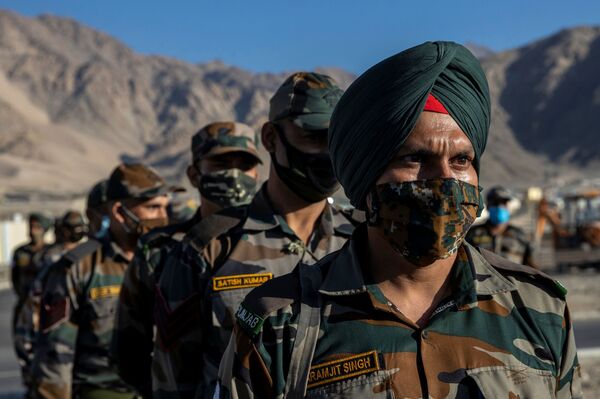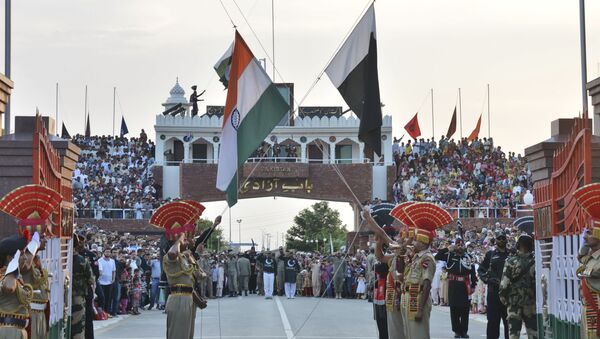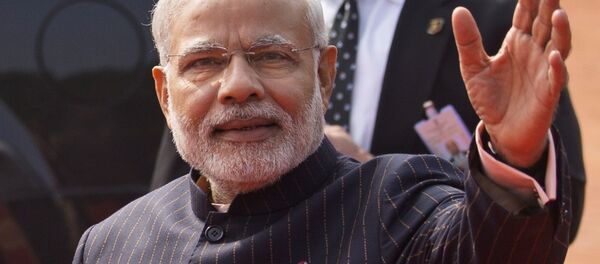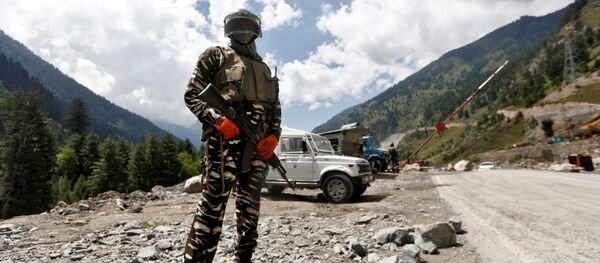Sputnik: India has been elected as a non-permanent member of the UN Security Council (UNSC) for 2021-2022. How would India use this platform to promote its values and interests and international peace and security?
Ambassador T.S. Tirumurti: India was elected as a member of the UN Security Council for the period 2021-22. This will be the eighth time that we would be serving on the Council.
As a major country and a steadfast supporter of multilateralism, India has always been committed to promoting responsible and inclusive solutions to international peace and security.
We have also always been at the forefront of strengthening the United Nations and its response to various international issues over the years. As we enter the UN Security Council, I am confident that India’s contribution in the areas of peace and security, international terrorism, reform of multilateral system, peacekeeping, people-centric technology gender focus and peacebuilding and development will find resonance among the Member of the Security Council in the next two years.
Our commitment to the UN reflects our strong values and interests. Sometimes countries tend to forget that India is as much a country as it is a civilization. We bring with us robust universal values. As our Prime Minister articulated on several occasions earlier, we have always believed in the philosophy that “The World is One Family”.
Sputnik: India's bid for a permanent seat at the UNSC: Why is it important to see India among the most influential nations at the Security Council?
Ambassador T.S. Tirumurti: India represents one-sixth of humanity; we are the sixth largest economy in the world; we are a major and a positive contributor to the global commons; we are a founding member of the United Nations; We have made substantial and even pioneering contribution to several issues in the United Nations. Consequently, it is only natural that a country like ours should take its rightful place as a Permanent Member of the Security Council.
The world of today is not the same as 75 years back. There are increasingly complex and inter-connected international challenges. In the face of these, the existing multilateral governance structure is almost dysfunctional. This is why India, along with several other major countries, has called for expansion of the Security Council membership to include representation from emerging and developing countries of Asia, Latin America and Africa, in both the permanent and non-permanent categories, in order to achieve a representative, inclusive, equitable, responsive and effective UN Security Council.
Sputnik: What are the preconditions to occupy the permanent seat at the UNSC, and what is the timeframe that India lays out for it to happen?
Ambassador T.S. Tirumurti: I understand that the Permanent membership in the Security Council was granted to five states based on their importance in the aftermath of World War II. In 1945, the total number of UN members were 51. The last time the Security Council got enlarged was in 1963, when the UN membership was 113 members. This year, we are celebrating the 75th anniversary of the UN and our membership stands at 193. However, we are nowhere close to even agreeing to expanding the membership of the Security Council, leave alone permanent or non-permanent categories.
The failure to reform the Security Council has serious implications for international peace and security. What we are seeing is a lack of progress on Security Council reforms in the Inter-Governmental Negotiations process. The process has dragged on for over a decade. Those who are not in favour of reform are using this Inter-Governmental Negotiations process as a smokescreen to stall any progress. This is indeed most unfortunate.
Consequently, we believe that the time has indeed already come to move towards a result-oriented process, with provision for substantive negotiations based on a single comprehensive text, in a formal setting in a fixed time frame. We cannot allow reforms to be held hostage by those who would prefer the status quo and stop progress.
Sputnik: Do you plan to bring in the near future the topic of border issues with China any time soon?
Ambassador T.S. Tirumurti: We have a broad-based engagement with China. There are a number of issues on which we have convergence, there are issues where we try to appreciate each others’ point of view but approach it differently and there are issues on which we have disagreement. However, both sides have the maturity to deal these issues bilaterally through the existing confidence building mechanisms. We are already doing this. We do not see a role for the UN in our bilateral matters.

Sputnik: Does India intend to raise the issue of its relations with Pakistan at the UNSC?
Ambassador T.S. Tirumurti: Let me at the very outset state that India desires normal neighbourly relations with Pakistan. We are committed to addressing all outstanding issues bilaterally and peacefully in accordance with the Simla Agreement and the Lahore Declaration. This is not only our position but also the perspective of an overwhelming majority of the Security Council members, including Russia. Pakistan has attempted to muddy the waters by trying to internationalize the issues, but has found no takers within the international community or in the United Nations.
Let me reiterate categorically that the Union Territory of Jammu and Kashmir is entirely an internal matter of India and no country has any locus standi in this.
Also of great concern is the treatment of minorities in Pakistan. The voice of minorities has been completely stifled and the State authority is being brutally used against them. This is clearly reflected in the drastic decrease of the percentage of minorities of the Pakistani population.
Any meaningful dialogue with Pakistan can only be held in an atmosphere free of terror, hostility and violence. The onus is on Pakistan to create such a conducive atmosphere.
Sputnik: What is your position/ opinion regarding Russia's Collective Security Concept for the Persian Gulf Region introduced a year ago?
Ambassador T.S. Tirumurti: To India, Russia remains a strategic and privileged partner with whom geopolitical convergence is a key consideration even in changing circumstances. Our relationship with Russia has remained very close over decades. Therefore, any proposal from Russia is given serious consideration by us.
In this particular context, we have noted the proposal put forth by Russia. In fact, an Indian expert had participated in the Track 2 Conference held in Moscow last September and found the discussions exploratory and useful.
In our view, any security architecture in the region must be inclusive and take into account the interests of all the countries within and outside the region.
The Persian Gulf is an area of strategic importance for us. It is in our extended neighbourhood. We have interests in terms of security, energy, trade, investments, besides our huge diaspora that lives and works in the countries of the region.
India has been playing a leading role in maintaining peace, security and stability in the Indian Ocean, including the Gulf region and, in this regard, we have enhanced our security cooperation with the countries of the region and have increased our naval presence.
Sputnik: The COVID-19 pandemic: India, as many other nations, has been hit hard by the virus. What assistance does India receive from the UN systems?
Ambassador T.S. Tirumurti: While India has not asked for any assistance from the UN system, I would nevertheless like to underline that India has immediately come to the assistance of more than 150 countries through supply of medicines and humanitarian assistance during the COVID-19 pandemic.
We have a strong development partnership with many developing countries and we are equally conscious of the role which India continues to play in the context of South-South Cooperation. We will, therefore, play our part, especially during the pandemic, both bilaterally and through the India-UN Development Partnership Fund, to assist and support developing countries during this crisis which Mankind is facing.
Sputnik: What is your position regarding the US decision to withdraw from the World Health Organization?
Ambassador T.S. Tirumurti: I do not wish to comment on the US decision. I can, however, enumerate our own approach to the World Health Organization. We have and continue to be an active member of the WHO. India’s Minister for Health and Family Affairs is the Chair of the World Health Organization’s Executive Board.
However, it is also a fact that every process and institution must evolve to meet the needs of its time. No institution can remain frozen in time. Therefore, we need to consider the resourcing and regulatory parameters set out for the World Health Organization to address and resolve shortcomings so as to make the Organization more effective for the current time.
In fact, I would venture out so far as to say that we need dispassionate scrutiny and reform of all multilateral entities to make them purpose-built for our times. This is why our leaders continue to call for ‘reformed multilateralism’ -- one that is relevant for the age in which we live, not when this architecture was erected.
Sputnik: What do you think about the US' recent move to snapback all UN sanctions against Iran?
Ambassador T.S. Tirumurti: Iran, as you would know, is a country which is in our extended neighborhood. We share deep civilizational and historical ties with this country.
India is not a party to the JCPOA. But we had extended our support for implementation of the JCPOA. We have noted that after the US announcement of its withdrawal from the JCPOA in 2018. We have also noted the variance in positions between the various Members of the Security Council on the “snapback”.
I wish to point out that India has always maintained that the Iranian nuclear issue should be resolved peacefully through dialogue and diplomacy by respecting the international community’s strong interest in the exclusively peaceful nature of Iran’s nuclear program.





